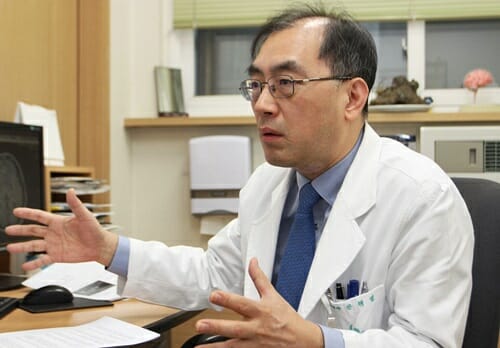Even if you notice unusual behavior or changes, if you ignore them, you can miss out on your health. If the size of your handwriting or voice has become smaller, you cannot smell well, and you drool more frequently, medical staff advise that you should suspect Parkinson’s disease, one of the three major geriatric brain diseases along with dementia and stroke.
Professor Ahn Tae-beom of the Department of Neurology at Kyung Hee University Hospital said about Parkinson’s disease, “The pattern and onset of symptoms varies from patient to patient, so in the past, we focused on symptoms of motor abnormalities such as tremors and slowness, but recently, we have focused on depression including dementia, abnormal sense of smell, and sleep disorders.” “We also consider non-motor symptoms, such as complexities,” he said. “If you have tremors or appear to be slow and dull while sitting still, it is better to undergo a neurology examination and examination rather than accepting it as a part of the aging phenomenon.”
Parkinson’s disease is largely divided into three types. ▲Idiopathic Parkinson’s disease with unknown cause ▲Secondary Parkinson’s disease caused by stroke, post-infectious encephalopathy, etc. ▲Parkinson’s syndrome, which is similar to Parkinson’s disease but has a weak response to treatment and progresses quickly.
The initial symptoms of Parkinson’s disease do not appear until several years after brain nerve cells are destroyed. Because symptoms appear gradually, it is important to get an accurate diagnosis under the observation of a professional medical professional.
Professor Ahn Tae-beom said, “The most important thing in diagnosing Parkinson’s disease is the findings of neurological examination, and if necessary, brain MRI and PET examination can be combined to increase the accuracy of diagnosis. After diagnosis, rather than thinking only of treating symptoms immediately, it is necessary to monitor the progression of the disease as a whole. “We need to look at the symptoms and develop a treatment plan appropriately,” he said. “Even if each patient shows the same symptoms, the severity of the symptoms and response to the medicine are different, so we need to approach treatment tailored to each patient.”
Professor Ahn Tae-beom of the Department of Neurology at Kyung Hee University Hospital explains the prodromal symptoms of Parkinson’s disease.
Treatment methods include medication, rehabilitation, and exercise. Drug treatment should not be postponed just because symptoms are mild and do not interfere with daily life. This is because dopamine deficiency can worsen abnormalities.
If symptoms of motor fluctuations (rigidity, bradykinesia, gait disturbance, etc.) have worsened due to long-term medication use, surgical treatment should be considered. There are two types of surgery: destroying part of the brain tissue and deep brain stimulation, which involves inserting electrical electrodes into the brain and passing an electric current through them.
Related articles
Professor Ahn said, “No treatment currently in use can restore lost brain cells to normal, but it is important to make an early diagnosis and start appropriate treatment when early non-motor symptoms are detected.” He added, “Parkinson’s disease requires patients and their guardians “If you understand the disease well and actively participate in the treatment process, you can maximize the treatment effect, and if early detection, appropriate exercise, and drug treatment are done well, there is a high possibility of maintaining a stable life for a considerable period of time,” he said.
For Parkinson’s disease patients, exercise is as important as taking medication. There is no limit to the type of exercise. It is best to do activities such as walking, gymnastics with bare hands, treadmill, yoga, etc. within the scope of your ability every day and at an intensity that leaves you breathless for about 30 minutes at a time.
2024-01-09 20:00:01
#1분 #건강 #Smaller #handwriting #voice #inability #smell #precursor #symptoms #Parkinsons #disease


